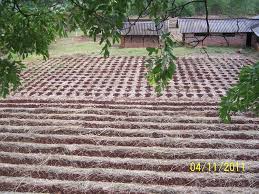Pfumvudza: All set to go with inputs rollout
Farmers who have completed their land preparations required under the Climate-Proofed Presidential Inputs Scheme, popularly known as Pfumvudza/Intwasa, have started receiving inputs so that they are ready whenever they are given the go-ahead to plant as sustained rains start to fall.
The programme this year has attracted many farmers who did not participate last season. To show their interest and seriousness, as well as make the programme practicable, farmers need to have Agritex certify that they have prepared their plots and so will be using the inputs correctly.
According to Agritex, farmers who have done their training and completed land preparations have already received inputs.
Agritex chief agronomist Mrs Rutendo Nhongonhema yesterday said they were urging farmers to intensify land preparation so they plant early to attain high yields.
“All farmers who have finished land preparations now have inputs at their farms,” she said.
“We are targeting to start planting first of November as it is anticipated that most areas would have received enough rainfall for germination by then. Farmers in areas that would not have received rainfall will have to plant with 2 litres of water per hole. Early planting is beneficial and doubles yields,” she said.
Mrs Nhongonhema said the success of the Pfumvudza programme last season saw a number of farmers adopting the cropping technique and they underwent training this season.
“We are training both old and new farmers. And only when one would have finished the recommended land preparations are inputs distributed.
“We have had an overwhelming response from farmers who did half plots last season and those who ignored the programme. After seeing the high yields from the Pfumvudza plots during the past season, most of these farmers have adopted the technique this season,” she said.
The Pfumvudza/Intwasa programme, designed for small-scale farmers, will this season benefit 2,3 million households in the communal, A1, small-scale commercial farming and old resettlement sectors to produce cereals, oilseeds and legumes in the forthcoming summer cropping season.
Pfumvudza is a concept aimed at climate proofing agriculture by adopting conservation farming techniques and involves use of small plots and applying the correct agronomic practices for higher returns.
The concept will be applied to maize, traditional grains and soyabeans. The programme also commercialises smallholder agriculture. About 1,5 million households are expected to plant 280 000 hectares of maize under
Pfumvudza to produce 1,4 million tonnes of the crop.
The Government is targeting 540 000 households to put 103 680 hectares under sorghum to produce 487 296 tonnes.
For soyabeans, Government is targeting 560 000 households to plant 20 000 hectares and produce 30 000 tonnes while 500 000 households are expected to plant 32 000 hectares of groundnuts and produce 32 000 tonnes.
About 260 000 households are expected to put 49 920 hectares under pearl millet and produce 124 800 tonnes.
The programme will support five Pfumvudza plots of 39m x 16m in each household with a standardised crop input package drawn from maize, sorghum, pearl millet, soya beans, sunflower, groundnuts, vegetables and cow peas.
In the low potential areas, the five plots will comprise three maize plots, one for family food and twoto produce grain for sale, one plot on half the farms for soya beans and one plot under sugar beans or groundnuts or cow peas.
In low rainfall agro-ecological regions, three plots will be put under cereals maize, sorghum and pearl millet.
The maize plot is for household food and the other two plots under traditional grains for commercial sale.
The fourth plot will be put under sunflower or castor bean, while the fifth will be put under cowpeas or groundnuts to provide household food as well as supporting cereal or legume rotations.
Input packages will include lime, basal fertiliser, top dressing, folia fertilisers and pesticides.
Each farming household will get an input package comprising seeds massing 10kg maize, 5kg sorghum, 2kg pearl millet, 5kg soyabean, 2kg sunflower/castor bean (castor bean will be intercropped in the Pfumvudza crops for all crops) and 5kg sugar beans or 5kg cowpeas or roundnuts.
Some farmers will get 5kg of summer wheat, long season variety, 2x50kg of Compound D fertiliser, 1x50kg top dressing fertiliser, and chemicals for fall armyworm or stalk borer. The seed types and varieties will depend on the farming region.-The Herald








